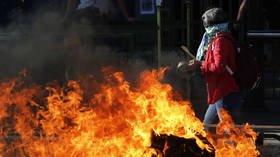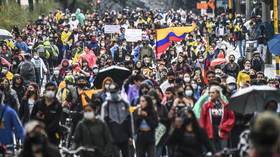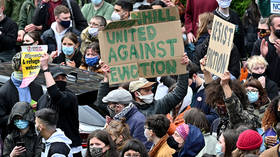Nearly 50 years on, Chileans finally exorcise the ghost of Pinochet – will this herald an anti-US ‘Latin American spring’?

Voting for an historic constitutional assembly hands victories to leftist and independent candidates over the ruling right-wing government and paves the way for a long-awaited progressive ‘new Chile.’
Following years of protest and unrest, Chile’s vote on a constitutional convention has delivered a political earthquake. Chileans have elected a “left-leaning” assembly, overturning a neoliberal political status quo that has governed the country for decades, following the US-backed coup of the 1970s.
The vote paves the way for widespread reforms in what has been traditionally known as the most free-market and capitalist country in Latin America, but also one that is strikingly unequal. Crucially, center-right conservative parties failed to secure a critical one-third of seats in the body that will draft the new constitution over the next year, meaning they lack the votes to veto radical proposals.
It also gives the left a springboard to November’s key presidential elections when the centre-right ruler, Sebastián Piñera, who has repeatedly been accused of being out of touch, looks odds-on to lose.
Chile’s stock market dived and its currency fell in value as businesses took fright at the victory of the left and independents. Gabriel Boric, of the Broad Front, predicted it would mean major changes. “We are looking for a new treaty for our indigenous populations, to recover our natural resources, build a state that guarantees universal social rights,” he said. “We’re going to start from scratch and build a new Chile”.
Events in Santiago are hardly standalone in South America; they follow a trend, which has also been seen in Colombia, of popular discontent amongst young people demanding change.
Chile, the world’s largest copper producer, is a country that has suffered enormous upheaval, yet has simultaneously been somewhat more economically successful and more stable than many of its neighbours, but has been mired by historical controversy. It has been under the stranglehold of the US, and while it cannot be branded a total failure, few would find that a justifiable excuse for Washington’s long-standing interference.
In the 1970s, the United States did as it continues to do today, aggressively enforcing its ‘Monroe Doctrine’ approach to the Americas against the backdrop of the Cold War, aggressively stomping out any Communist-leaning state either by fomenting a coup d’etat, civil war or even an outright invasion.
The last time Chileans voted emphatically for the left was in 1970, when Salvador Allende, a Marxist, was democratically elected as president. American opposition to him was long entrenched, with the CIA having invested up to $5 million into his political opponents in its attempt to undermine him and try to stop him from being confirmed in office.
Also on rt.com Chile’s referendum rejecting the Pinochet-era constitution shows that the world is entering a new, anti-neoliberal ageWith Richard Nixon in the White House and Henry Kissinger as secretary of state, it was an administration that leaned towards a brutal, realist foreign policy. The CIA’s failure to stop Allende getting elected moved quickly to Plan B, which involved initiating a direct military coup to remove him from power.
Thus came the rise of army general Augusto Pinochet, who, backed by the US, overthrew Allende in 1973; the 65-year-old president was found dead, in what was an apparent suicide, as troops stormed the presidential palace.
Pinochet quickly became the most notorious of Latin America's 20th-century military rulers. He brutally suppressed left-wingers, killing, interning and torturing thousands. He initiated a radical program of neoliberalism which involved wide-scale privatization, reduction of tariffs, restrictions on trade unions and anti-welfare policies. He ruled between 1973 and 1990, after which he remained as army commander-in-chief, then senator-for-life, and bestrode the final decades of the Cold War in the region.
His western-backed regime had a profound influence on Margaret Thatcher, who assumed power in Britain in the same decade and embraced him as a friend and ally.
Despite the brutality of his rule, not all of Pinochet’s economic policies were a failure, strictly speaking. On paper, he seemingly created the most financially stable country in all Latin America with the strongest bond ratings and a GDP per capita of $25,000, persistently leading all South American countries on most counts. It has avoided the economic stagnation seen in Brazil and Argentina, among others.
However, what about the ordinary person? Did much, or any, of the country’s wealth trickle downwards? Not much – for all its rosy achievements, as a neoliberal, oligarchic state, Chile became deeply unequal, causing resentments and dissatisfactions that have now reached boiling point. This uneven playing field, where the elites enjoy massive privileges while the impoverished majority have little, caused violent, mass uprisings in 2019, sparked by a planned increase in the price of metro fares.
This state of affairs is the final legacy of Pinochet. A neoliberal state which created a prosperous society, but a far from fair one; a society which worked very well for some, but badly for most. In electing a radical left-wing constitutional convention which will now dismantle the rules and system Pinochet inaugurated, a revolution is taking place which rejects his economic doctrine.
In Latin America, Chile is not alone. Similar unrest has been sweeping Colombia, and for near identical reasons. There is an obvious pattern: the United States supports or installs a regime it politically dominates, and which implements free-market fundamentalism and anti-socialist policies, which upsets the majority of the population.
Thus, this is a potential ‘Latin American Spring,’ a momentous set of uprisings in search of more equal and fairer policies, a longstanding struggle by the ordinary people of the continent against those elites backed by the United States.
From his tomb in Santiago’s General Cemetery, where his remains were interred after initially spending three decades in an unmarked grave, Salavador Allende may be smiling at the prospect of that.
Five thousand miles north, there are more likely to be frowns. Forty-eight years on since overthrowing one leftist regime in Chile, what will Washington do now?
Like this story? Share it with a friend!
The statements, views and opinions expressed in this column are solely those of the author and do not necessarily represent those of RT.
















